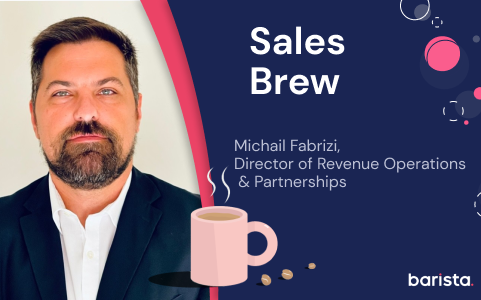Sales Brew - Sam Sweeny, Sales Operations Manager

Roy Weinstock
For the 5th episode of Sales Brew by barista AI, we had the opportunity of hosting Sam Sweeny, an experienced Sales Operations leader that started his journey in sales. We’ve discussed the advantage of having a sales background when leading the operations department, the data hygienic challenges every RevOps is dealing with, and more. If you’re a data-driven revenue leader, sit back and enjoy this one.
To watch the full interview and get updated on every sales brew episode, subscribe to our YouTube channel. A short version and transcription are below. Get a cup of coffee and enjoy the show!
Can you tell me a bit about yourself?
I was born and raised in the Boston area. My background is in sales and revenue operations, which I have been involved in for over a decade. I began my career at Apneta, where I started as an intern and worked my way up from the bottom. I was fortunate enough to catch on with the marketing operations team, which handled all operations globally, and eventually moved to the sales team when the original team split into sales and marketing operations.
I spent over ten years at Apneta until the company was sold, after which I found myself in the open job market. I was able to catch on with Wheel and worked with them for about a year until they went through some layoffs. Throughout my career, I have worked in the sales and marketing and business and rev Op space, and have seen the industry shift and change during my time.
I am excited to have the opportunity to talk to you about how the role has evolved over the past decade, as I have worn many hats throughout my twelve years of experience in this field.
How did you get into Revenue Operations?
Initially, it was based on need. When I started out, I wasn’t entirely sure what I wanted to do in the corporate world. I had the opportunity to work on the marketing operational side and found that I really enjoyed it. So, I decided to pursue a career in revenue operations.
In the beginning, I started by managing small things like Google AdWords campaigns, manual data entry, and some light data hygiene work. I got my feet wet and gradually gained more experience.
What really appealed to me about this field was the broad perspective it provided. By working in these roles, you gain insights into different aspects of the company, and you get to learn about the ins and outs of many different areas. For someone early in their career like me, it was really rewarding to get a chance to see so many different aspects.
Working in revenue operations provided me with a unique way to interact with every stage of a business. I got to see the sales funnel process, the marketing funnel process, how top-of-funnel leads matriculate through the funnel, and how product responds to the needs that sales are presenting back to them. All of these different aspects of the business are crucial to generating revenue.
How important do you think it is to grow into a revenue operations role from a client-facing role like a sales representative?
Certainly, coming from a client-facing role like sales can significantly impact one’s perspective in a revenue operations role. It’s crucial to be aware of this because it can sometimes lead to a sales-focused lens on operations issues. However, starting in sales can provide valuable insights into how the product is being received, the challenges that the sales team is facing, and what tweaks are required to the roadmap.
As someone who started in sales operations and then transitioned into general revenue operations, I’ve always focused on operationalizing data from the sales team. This involves collecting and analyzing the data and using it to inform other areas of the organization, primarily the product and marketing teams. In this way, the data can reflect back on the sales process, improving it and making the seller’s job easier.
While starting in sales may color one’s perspective in a specific way, it can be an effective way to look at a revenue-generating organization. It helps to understand what other people are thinking about the product or service when a salesperson pitches it to them. Ultimately, it’s about using this information to make data-driven decisions that drive revenue growth.
What are the most urgent CRM challenges you’re always facing?
I believe this is an area where I have evolved in my career. My entire background has been about data hygiene, a topic that has always fascinated me. I started with manual data entry, but I also looked at ways to operationalize data quality. This involved looking at third-party tools in the market or using Salesforce automations and validation rules to gatekeep data quality as sales reps interact with it in real-time. However, I have learned to appreciate that end-users are people, and the pursuit of great data cannot impact their ability to operate within the CRM. I have become less of a zealot on sales and more focused on the end-user. They need to be in control of the data entry process, and we can use validation rules and data hygiene dashboards to help them ensure data accuracy. Third-party tools are valuable in reducing the burden of data entry for sales reps, so they can spend more time selling. I believe this is a challenge to operationalize the process of data hygiene without putting the burden solely on the end-user. It’s about working with the sales team to get a full data picture while making it easier for them to generate data, rather than just gatekeeping what they can and cannot put in Salesforce. It’s a tricky balance, but one that is hugely important.
What is the #1 tip to govern CRM data?
I think the number one tip for governing CRM data is to prioritize the most critical data elements that are either missing or incorrect. Rather than looking at data hygiene from a broad perspective, it’s important to establish with both executive management and the people on the ground, what the key pieces of data are that need to be addressed. This approach can be less daunting and more actionable. It’s crucial to identify a few crucial pieces of data early on, solve them, and then replicate the approach by taking it one step at a time. By breaking down the problem and focusing on one key data element at a time, you can avoid overwhelming sales teams with too many processes, which can drive down adoption rates. It’s also important to tie data hygiene back to revenue and value. By focusing on key fields that are critical to specific initiatives, organizations can prioritize data hygiene efforts and generate better outcomes.
What are the main objectives for you as RevOps, and how it differs from having clear numerical objectives as a sales rep?
I agree that the RevOps role can be more ambiguous compared to having clear numerical objectives as a sales rep. However, as a RevOps professional, my main objective is to act as the connective tissue between different departments within an organization. I strive to have insight into processes that may not be in someone’s wheelhouse but still have an impact on their work. By being an organization-wide subject matter expert on processes, I can ensure that new initiatives fit smoothly within the existing landscape of processes. I aim to instill confidence in my colleagues that I have a holistic view of operations and can provide guidance on how to navigate different processes.
In addition to being a subject matter expert, I believe that it is essential to empower others to take ownership of their day-to-day work within a CRM. By building dashboards and teaching others to find data for themselves, I can reduce the workload on the RevOps team and give sales reps quicker access to the data they need. I think being a good communicator on new initiatives, such as new sales or support processes, is also crucial to demonstrating my value to the organization.
Unfortunately, there is no specific quota to measure the success of the RevOps role. Instead, I believe that the value I bring will be judged based on the confidence and comfort that others have in my role. I aim to lead by actions, ensuring that projects are shepherded through to the end, and ultimately convince others that I am the subject matter expert I purport myself to be.
How do you drink your coffee?
I drink my coffee buy the gallon and black.
To watch more from Sales Brew about sales operations and more:
- Episode 1: Sales Brew with Tyler Meckes, Account manager at Dooly
- Episode 2: Morgan J Ingram, Director of Sales Execution and Evolution at JB Sales
- Episode 3: James Buckley, Chief Evangelist and Master of Ceremonies at JB Sales
- Episode 4: Nieka Mamczak, Head of Sales Enablement at StackOverflow
- Episode 5: Sam Sweeny, Sales Operations Manager
- Episode 6: Benjamin Roach, Global Sales Operations Manager at Ardoq
- Episode 7: Elgun Aliyev, Salesforce Admin at CentralReach
- Episode 8: Amanda Harwood, Sales Operations Manager
- Episode 9: Jake Rasmussen, Salesforce Consultant


